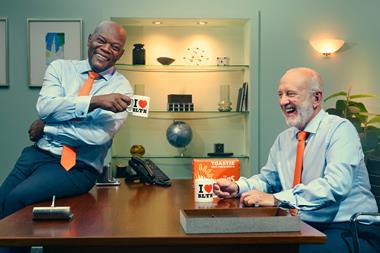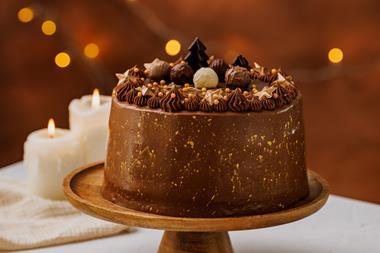Morning goods and on-the-go food continue to be strong performers at breakfast, but toast could be hot stuff in 2017, says Ashley Williams
Download a pdf of this report here
Brits have been giving sliced bread the cold shoulder lately, but with interest in morning goods on the rise, perhaps toast is set to enjoy a revival.
Allied Bakeries is hoping so after investing in a new Kingsmill Super Toasty. Rolling out at the beginning of this month, Allied claims it offers consumers the ‘best ever toast’.
“It has been developed in line with what we know consumers want,” says Allied Bakeries category director Zoe Taphouse. “Kingsmill Super Toasty is a thicker loaf than standard, giving a unique toasted slice which is light and crispy on the outside and soft and pillowy on the inside.”
Citing Kantar Worldpanel data, Taphouse points out that breakfast is the UK’s single biggest meal occasion and presents a huge opportunity for bakery.
“With 84% of breakfast occasions being at home and with consumers looking for choices that fill them up and fuel them for the day, we developed Kingsmill Super Toasty as a breakfast option that would reignite the breakfast market and remind consumers of the simple pleasure of toasting,” she adds.
Brits need no reminder when it comes to bagels, though, with volume sales rising, according to Kantar data, although price cuts have impacted value sales. In particular, people have found a taste for bagel thins which, in contrast to a decline in sandwich thins, soared 150% in value last year to £11.5m (IRI 52 w/e 7 November 2016).
It’s an impressive performance for a relatively young market: Kingsmill launched bagel thins in 2014, with Warburtons and Grupo Bimbo-owned New York Bakery Company joining the category the following year.
Crumpets are booming, with a 10.9% hike in value sales on volume up 10.7% (Kantar). The category has benefited from activity including the launch of Warburtons’ giant crumpet in 2015 – accompanied by a big-budget ad featuring the Muppets that returned to screens at the end of last year.
“Our Muppets advert captured the attention of the nation,” says Warburtons corporate communications manager Tearmh Taylor, adding that more than 20 million packs of Giant Crumpets have been bought since the launch. The product came under fire last month, however, when health campaigner Consensus Action on Salt & Health (CASH) flagged it up as one of a number of crumpets with high levels of salt.
Volumes of croissants grew even faster than crumpets, up 11.1% according to Kantar, while value sales have grown by a more modest 3.8% as a result of falling prices.
It appears Tesco’s decision last year to ditch curved-shaped croissants in favour of straight ones hasn’t done the category any harm. The retailer says 75% of customers say they prefer straight ones, as these are perceived to be better quality, more sophisticated, and easier to spread with jam.
“With the crescent-shaped croissants, it’s fiddlier and most people can take up to three attempts to achieve perfect coverage,” says a Tesco spokesman.
Marks & Spencer (M&S) has also been busy in the croissant market, rolling out the Croloaf, which is claimed to be the UK’s first croissant/loaf hybrid and was inspired by Dominique Ansel, who invented the Cronut.
M&S describes the Croloaf as “perfect for those who like the convenience of grabbing a slice of toast for breakfast, but love the delicious buttery taste of croissants”.
Meanwhile, busy consumers who find grabbing a slice of toast takes too much time are playing a big role in growing out-of-home and on-the-go breakfast sales. Data from research company NPD Crest shows the average price paid for breakfast is now 31% higher in the out-of-home foodservice market than it was eight years ago – while the average lunch bill has risen only 6.5%.
There is a danger breakfast could cannibalise lunch, warns NPD Crest director of foodservice Cyril Lavenant. “Some 16% of breakfast occasions away from home occur at the relatively late time of between 10am and 11am, meaning lunch for some might then just become a quick bite of something light that people bring from home,” he says. “In that case, they would skip buying their lunch from outside.”
When it comes to on-the-go, there has never been a better time for retailers to review their offerings to make sure they’re maximising this growing sales opportunity, suggests Vincent Brook, UK retail commercial manager for Aryzta Solutions. The business works with convenience retailers to maximise breakfast sales through its Pierre’s hot and cold food-to-go range.
“The importance of hot on-the-go breakfast items cannot be overlooked,” says Brook, who adds that independent retailers are increasingly dual-siting in-store bakery fixtures next to coffee stations to appeal to shoppers looking for an all-round breakfast option.“It’s a simple but effective way to boost on-the-go breakfast sales,” he says.
In-store bakery and foodservice supplier Country Choice believes food-to-go – especially breakfast lines – has proven to be a footfall driver.
“A retailer with a good breakfast offer will quickly establish a reputation in the local area and consumers build this into their routine – for example, breakfast on the way to work,” says Country Choice marketing head Stephen Clifford.
It’s particularly important for independent retailers to get their breakfast ranging right in light of further NPD research that shows Brits are snubbing independent foodservice operators in favour of branded businesses. Breakfast is a key reason for this, says NPD, stating that breakfast accounts for 14% of visits to branded outlets versus 8% for independents.
This has contributed to growth in branded operations outpacing independent rivals, with independents accounting for 44% of Britain’s £50bn out-of-home foodservice industry, down from 57% eight years ago. Sales through independent operators have fallen from £30bn in 2008 to £23.2bn this year, while sales through brands have risen from £20.9bn to £30bn.
Clifford at Country Choice says businesses should ensure they cater for the long-term trend towards healthier eating and that their range is kept up-to-date with healthy alternatives. “It makes sense for them to use lean bacon and there is no need for a spread in breakfast sandwiches,” Clifford adds.
The same cannot be said of toast, however. If it does make a comeback, you can guarantee it will be accompanied by plenty of spread.
Pass the butter.
Morning success for high street chains
Breakfast is driving sales growth among high street retailers, including Greggs and Pret A Manger.
Announcing third-quarter results last year, Greggs CEO Roger Whiteside said breakfast was the fastest-growing consumption occasion for the business.
“The breakfast phenomenon developing in the UK market has been going for about 15 years now,” he said.
Whiteside added: “More and more people are becoming short of time in the morning and grabbing breakfast on-the-go. The value we offer at Greggs is outstanding. We have held our meal deal at £2 for two years now.”
Pret A Manger has also benefited from strong sales of breakfast products.
In the company’s full-year results for 2015, it revealed that increased demand for breakfast on-the-go had driven growth, with 58% of sales made outside lunchtime.
Pret CEO Clive Schlee said the company continued to “grow steadily in the UK by adapting its menu to meet demand”.
Breakfast Bakery sales performance
Breakfast Bakery value sales
Cookies and cake for breakfast?
Health is a driving force in today’s food market but that doesn’t mean Brits can’t have a treat at breakfast.
Dawn Foods says cookies for breakfast are on the up and has recently promoted its luxury American-style baked cookies, as well as its ready-to-bake-from-frozen cookie pucks, which come in varieties including Triple Belgian Chocolate Chunk, Belgian White Chocolate Chunk and Cranberry & Belgian White Chocolate Chunk.
Jacqui Passmore, marketing manager for Dawn Foods in the UK and Ireland, believes bakers can expand sales by promoting cookies.
“Morning goods are often impulse purchases that are emotionally and comfort driven, so nostalgia is a key ingredient when it comes to appealing to consumers. Easy to produce by the baker and easy to eat on-the-go by the consumer, cookies are an increasingly popular
breakfast choice.”
Food trend expert Liz Moskow, culinary director of Sterling-Rice Group, suggests people could be eating chocolate cake for breakfast this year following studies praising dark chocolate for its potential health benefits.
“The thought was eating chocolate prepares you more for your workday. What better part of the day to incorporate dark chocolate into your meal than breakfast?” she says.
A study linked chocolate consumption to weight loss as it can reduce cravings, with researchers from Tel Aviv University recommending eating chocolate cake for breakfast as the metabolism is most active in the morning.
“Combining the study and the likeability of having dessert for breakfast, we predict breakfast might start seeing brunch amuse-bouche chocolate cakes or brunch and breakfast restaurants incorporating a robust dessert menu,” Moskow adds.
Whether mainstream retailers will introduce chocolate cake to their breakfast menus remains to be seen – particularly with high street food-to-go operators such as Greggs and Costa rapped by a survey on www.treated.com last year for selling “unhealthy” breakfast lines.





























No comments yet